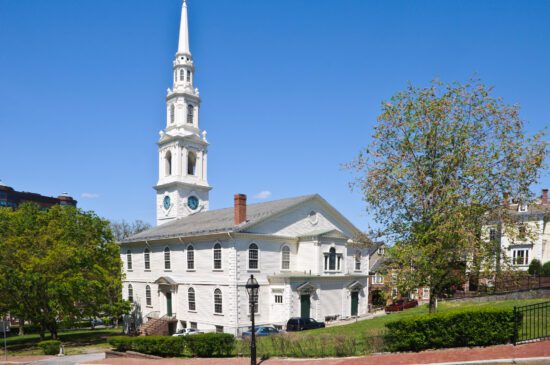My friend Rod Dreher has put forward an important observation and queryabout the cohesiveness and difference in moral convictions between evangelical Protestants and Catholics on matters related to culture war issues like abortion and homosexuality:
Here’s something I have never figured out. In theory, Catholics ought to be a lot more theologically conservative on such matters. They have a clear teaching proclaimed by a clear church authority, with a deep Biblical theology behind it. And yet, on the whole, it doesn’t seem to matter to lay Catholics. Evangelicals, on the other hand, have the Bible, but no binding interpretive authority to keep them from diverging. Yet, on these issues, they are more morally conservative than Catholics — even by Catholic standards.Why is this? I’m asking in a serious way. Any of you have a theory? I’m not going to publish gratuitous Catholic bashing or Evangelical bashing in the comments.
Dreher’s observation and question are clarifying and worth considering. Why is it that Catholics with an interpretive authority (the Magisterium) are all over the map on key moral issues while evangelicals (with all their attendant schisms) are relatively settled on the same issues?
I have two main responses to Rod.
First, I want to challenge the assumption behind Rod’s question that protestants are inherently prone to “interpretive pluralism.” I’d argue that there is much less interpretive pluralism in protestant evangelicalism than it is accused of by our Catholic friends. While we do not need to rehearse all the different denominations with varying interpretive conclusions, evangelical protestantism has not redefined itself out of existence. Why? Because protestantism (well, evangelicals, at least) recognize that the Bible is supremely authoritative. The Bible is the supreme guide for all matters related to faith (the norming norm). Furthermore, the essence of the faith that all protestants agree on is remarkably consistent and uniform (I have in mind the early creeds). Protestant evangelicals reject the Magisterium not only because we believe it is an unbiblical office, but that it isn’t even necessary. For all the protestant differences on matters that are important (Baptism, Lord’s Supper), the kernel of Christian doctrine is central and clear: Jesus Christ’s life, death, and resurrection. No Magisterium is necessary for what the Scriptures plainly teach and on issues that give rise to our culture wars, the Scriptures are resoundingly clear.
My second response is one that my Catholic friends may not like, but I have to say it with all respect: The difference in how evangelical Protestants and Catholics understand regeneration has enormous implications for one’s doctrine of Scripture, which has enormous implications for the consistency and uniformity of doctrinal-ethical convictions.
Catholics believe in infant baptismal regeneration. The overwhelming majority of Protestant evangelicals reject baptismal regeneration (I’m probably mistaken, but I cannot think of any evangelical branch that believes in infant baptismal regeneration). For Protestant evangelicals, regeneration occurs when a person becomes a new creation in Christ (John 3: 5-7; 2 Cor. 5:17). This makes possible the Bible becoming the living and active Word of God. Christians believe that a supernatural illumination is necessary for the Scriptures to be read authentically as God’s authoritative self-revelation. As the Apostle Paul says, “Therefore I want you to understand that no one speaking in the Spirit of God ever says ‘Jesus is accursed!’ and no one can say ‘Jesus is Lord’ except in the Holy Spirit” (1 Cor. 12:3). The implication of Paul’s statement is that believing Christian truths requires authentic regeneration accomplished by the sealing of the Holy Spirit (1 Cor. 1:13-14). Evangelical Protestants reject that infants can be born again of the Spirit without conscientious acknowledgment of who Christ is. How and when people become Christians testifies to their convictions on the Bible as the Word of God. Only a regenerate person can accept the supernatural claims and authority of the Bible.
But if a person is baptized but not regenerate, how can the Bible be supremely authoritative? That’s the crux of disagreement. Protestants believe that Catholics have a faulty doctrine of regeneration, which leads to a faulty understanding of what the Scriptures are to those who identify as Catholics but are not regenerate, which then allows for massive interpretive pluralism by self-professing Catholics on issues that are otherwise very clear in the Bible (ex: sanctity of life, sanctity of marriage). An unregenerate Catholic will not accept the teachings of the Bible as authoritative. My conviction on the matter is that evangelical Protestants breed a higher reverence for the Scriptures out of the conviction that the Bible is very Word of God, something that can be proclaimed only by a regenerating Spirit upon self-aware persons (1 Cor. 2:14-16). Said different: A biblical view of regeneration leads to a biblical view of biblical authority.
I offer this perspective with as much admiration and respect as is possible for Catholicism. Some of my closest friends are Catholic. Catholic allies are among the most devoted in today’s cultural trenches. And Catholic influence on my ethics, particularly natural law, has been immense. Still, that doesn’t change the fact that Protestants and Catholics disagree on some major issues. My Catholic friends would tell me I’m wrong, and that’s okay. Disagreement does not mean hostility. There are simply chasms between Protestantism and Catholicism that are unbridgeable.
For an amicable read on what unites and divides Catholics and Protestants, I would highly recommend Gregg Allison and Chris Castaldo’s The Unfinished Reformation: What Unites and Divides Catholics and Protestants After 500 Years.





